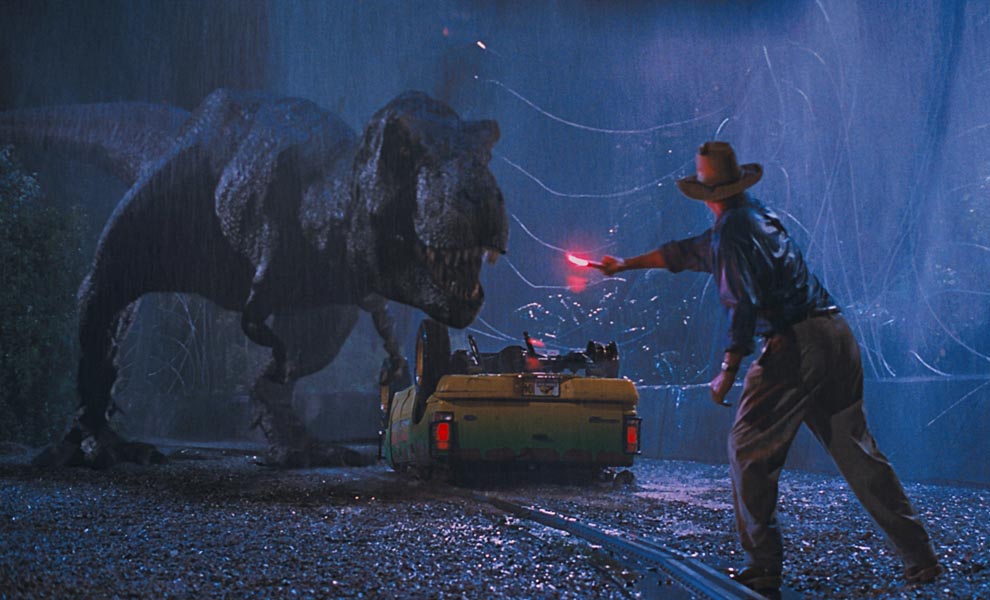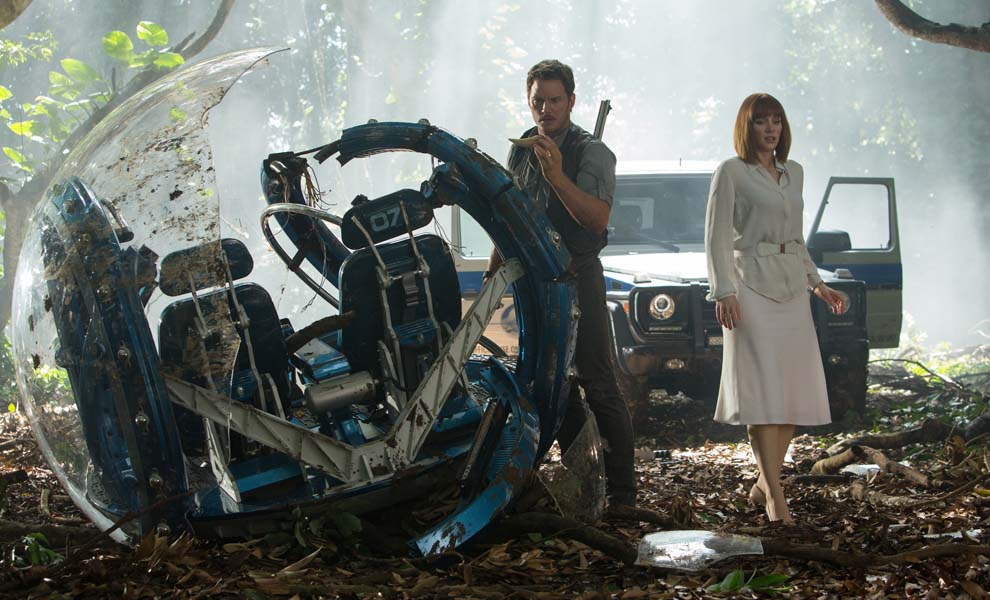
Scene from the 1993 movie "Jurassic Park" (CNS/Universal)
Last week, I was driving home after taking our youngest grandbaby Mary home to her parents after a full, exhausting and glorious day of daycare.
Our son Nick (who is nearly 30 and has autism) was in the passenger seat. It was a rainy evening, and along with the gentle flap-flap-flap of the windshield wipers, we were listening to the local classical station on the radio. Seattle's KING FM has a weekly program that plays excerpts from movie soundtracks.
Like many people with autism, Nick memorizes a movie the first time he sees it: the dialogue, the action, the music. Then he watches those same movies over and over and over, repeating the dialogue, acting out each action, humming along with each nuance of the music.
If you are unfamiliar with this phenomenon, watch the lovely documentary "Life, Animated" about Pulitzer Prize-winning writer Ron Suskind's autistic son, Owen, who lives and communicates* through Disney films and characters.
I recognized the current interlude playing on the radio, and said: "Hey, Nick. I know this one. It is from 'Jurassic Park!' "
Now Nick is a man of very few words — struggling and stuttering over the ones he does choose to share — but his response was both instant and irritated. "No, Mother," he sniffed, "It is 'Jurassic World.' "
At the end of the piece, the radio announcer confirmed just that. Once again, Nick was right, and I was wrong. This happens a lot.

Chris Pratt and Bryce Dallas Howard star in a scene from the 2015 movie "Jurassic World." (CNS/Universal)
Humbled, I finished the ride to the rhythm of the wipers, the resounding orchestration of John Williams from "Star Wars," and the realization that Nick is such a piker. Seriously. Inside that mysterious brain, he carries this vast library of information, remembered with perfect clarity and accuracy. But only rarely shared.
Like many people with autism, Nick has memorized a selection of rote phrases to drop into conversations, whether or not they actually fit the subject at hand. A recent example:
Me: "What was your favorite part about that movie, Nick?"
Nick: "Thanks! I am doing great!"
Getting any new information out of him is, as the saying goes, like pulling teeth. So, when Nick reveals glimpses of his huge catalog of knowledge in tiny, almost accidental flashes, I admit it just makes me feel grumpy. Because I want more.
That jump from sad to mad is my fault, not Nick's.
Along with his autism, Nick suffers from Tourette syndrome and obsessive-compulsive disorder, both of which are typified by repetitive, halting and freezing tics. If you have watched the movie "Awakenings," based on the memoir of neurologist Oliver Sacks' experience with victims of encephalitis, you may get a hint of the physical prison that is Nick's body and brain.
Nick did not talk until about age six, but he would bang around the house, humming the music from Disney's original "Fantasia" — concertos by Bach, Tchaikovsky, Beethoven, Stravinsky, Schubert — start to finish, and in key.
Every time, I have to struggle to make my face not betray the fact that I think they are oddly deluded or crazily flattering, or both.
His pediatrician kept using the "r-word" in relation to Nick. I told that doctor, "I agree that he is one quirky dude. But I am from a musical family, and I can't do that! The 'r-word' does not apply. Something else is going on here!"
After finding Nick's true diagnosis — and another pediatrician! — I took him to the many speech and behavior therapists who did so much to help Nick finally communicate with us.
People have often said to me: "Oh, you are so good with Nick. You are so patient."
Every time, I have to struggle to make my face not betray the fact that I think they are oddly deluded or crazily flattering, or both.
I do my best to smile and nod thanks, but what I am mentally screaming is: "What are you talking about? Who are you looking at?!"
Because I am really bad at this. Really. Really. Bad.
I have zero patience. I have long said that there must have been two lines in heaven. The sign above one line reads "Patience," and the other sign reads "Enjoys Cooking." I obviously picked the shorter line!
From the moment I start to get Nick out of his bed every morning, then go back and back and back to actually get him to follow through, I am a grouchy, impatient mess. I urge him with escalating frustration to sit up in bed, get out of bed, take off his pajamas, put his robe on, get out of the room, make his way to the shower, turn on the ceiling fan and the shower, set his timer, take his shower, turn off the water when the timer goes off after 10 minutes, dry himself off, get back into his robe, get back to his room, get dressed, get out of his room, take his morning meds, join the family for breakfast, and so it goes.
Me forever nagging, and him freezing, turning, jolting, gesticulating within the tics that constrict and control him.
We have danced this dance for almost 30 years.
When Nick schooled me with that "Jurassic World" correction, a tiny light bulb flickered dimly above my tiny brain. If that quote often attributed to Albert Einstein — "The definition of insanity is doing the same thing over and over again, but expecting different results" — is correct, then I am and have long been just plain bananas.
This wee voice of inspiration whispered: what if I used Nick's preferred language — instead of my incessantly irritating voice — to inspire him to some kind of autonomous movement throughout his day? What if I called for help on those tonal touchstones from the musical museum in his head, instead of jabbering on at him?
So, the other day, I tried it. I woke up Nick with the theme from "Star Wars" blaring from my tablet computer, which I put on his dresser, just inside his bedroom door.
I smiled and waved from the doorway: "Hey, good morning. Your music is going to help you start your day, instead of me, OK? What do you think about that?"
Nick's sleepy grin was a nice answer.
And I did my best to back off. It was hard, but I just stayed away. I drank my coffee, I unloaded the dishwasher. I wanted to bug him, but I didn't.
And somehow, amazingly enough, Nick emerged from his bedroom in his bathrobe, without so much as one nag from me.
I said, "Wow, buddy. Good job. After your shower, what music do you think will help you make your toast and hot chocolate, all by yourself?"
He looked at me quizzically from under his dark eyebrows. But he knew the answer. " 'The Dark Crystal,' of course."
I nodded, "You got it. See you after your shower."
I retrieved the tablet from his bedroom, located the "Dark Crystal" soundtrack, and queued it up for when Nick returned to the kitchen, hopefully damp and clean and sometime soon.
Again, I wanted to follow him. To sit outside the door. To make sure he got it right. But I didn't. It was hard. I am so bad at this.
Advertisement
I found myself smiling with pride at the realization that he can and will be just fine if I am not peppering him with help. And I squeezed out a few hot tears of amusement at my own thick stupidity.
I heard the sound of the shower starting in the bathroom above the kitchen, the water streaming down the drainpipe. I heard the electric vibration of the ceiling fan, and the metallic ding of his timer being set.
As I washed the dinner pans that had been soaking in the sink all night, I found myself humming. I think it was from "Jurassic Park." But of course, I have to ask Nick to be sure.
*This story has been updated to clarify a sentence.
[Amy Morris-Young graduated from and taught writing at Loyola Marymount University in Los Angeles.]








